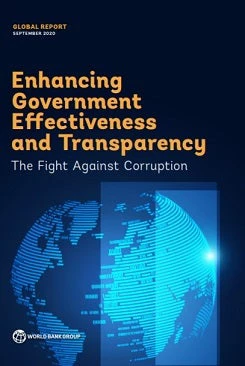Corruption has long been recognized as a major impediment to development. From massive theft of state assets to the low-level corruption that erodes productivity and weakens service delivery, corruption steals from the poor and erodes progress.
Corruption takes many forms. It is the foreign company that pays kickbacks or bribes to get preferential treatment, leaving poor countries with devalued goods or services. It is the public officer who betrays the people he is charged to assist for financial favors. It is the town that has no school or health clinic because local officials have stolen the money that would have built them. And it is prescriptions that don’t cure—or could kill—because someone has diluted them or substituted counterfeit medicines.
“If unchecked, corruption poses a threat to reducing poverty and supporting shared prosperity as well as the SDGs.”
This agelong problem keeps evolving and we still find news headlines filled with scandals of corruption, touching virtually every continent.
Once entrenched, corruption is hard to root out, and focusing only on strict enforcement tends to make little progress. In many societies corrupt behavior is deeply rooted in the social norms and political culture, and the incentives to maintain the status quo are powerful. Corruption can lead to the theft, wastage, and misuse of scarce resources. It can also entrench elite privilege and inequality, undermining institutions of accountability with lasting consequences and diminishing citizens’ faith in their own governments. The scope for reformers to make changes can be limited and making inroads against corruption can take a long time.
While some of the principles for controlling corruption are well known—transparency and accountability, open government and civil society monitoring, detection and enforcement—the strategies for applying them can vary considerably depending on the context. The world is changing, becoming hyper-globalized and seeing the advent and penetration of new technologies offers both challenges and opportunities.
The World Bank’s new report Enhancing Government Effectiveness and Transparency: The Fight Against Corruption, being released this week on the sidelines of the United Nations General Assembly helps to bridge the gap between a seemingly intractable problem and the need for solutions that have worked or show potential to work.
It highlights the importance of complementing the traditional methods of dealing with corruption with advanced ones like GovTech, e-Procurement, Asset and Income Disclosure, and Beneficiary Ownership, which have been used in countries like Somalia, Bangladesh, Colombia, Ukraine and Romania, amongst others.
Progress is possible even in challenging contexts. Measures to control corruption are often opportunistic, targeting specific areas of vulnerability where and when the political space allows for actions to be taken. Even when actions have apparently limited impact, they can provide important foundation for future progress. With these ideas in mind, the report will help equip public sector officials and civil society with approaches and tools that can be drawn upon and adapted to their specific country context.
The COVID-19 pandemic has resulted in large scale emergency spending by governments , sometimes without adhering to the regular check and balances. While speed is understandable, without proper controls it exposes governments to a variety of corruption risks that may undermine the effectiveness of their responses. The strains placed on the public sector in responding to the current situation present enormous opportunities for corruption to flourish.
As countries embark on the road to a more resilient and inclusive recovery, policy makers face the challenge of reactivating the economy in the context of huge fiscal stress compounded by the accumulation of large amounts of debt. Prudent use of scarce resources in a transparent manner is critical.
“Countries have an opportunity to build clean, accountable and transparent governments by introducing the highest standards of integrity through plugging entry points that allow corruption to flourish.”
The resources lost to corruption can be spent on reviving the economy and protecting the poor and vulnerable who suffer disproportionately.
Achieving long-term economic growth and shared prosperity requires us to work together with our partners in government, private sector, and civil society to address corruption and its corrosive impacts. We are committed to continue to raise awareness globally to sustain momentum in the fight against corruption.
RELATED
Report: Enhancing Government Effectiveness and Transparency: The Fight Against Corruption
Press Release: Curbing Corruption in the Midst of a Pandemic is More Important Than Ever, New Report Says
Website: The World Bank Group and COVID-19



Join the Conversation